Phoenix radio was successful in receiving a grant from Go Higher through the Leeds Community Foundation. The idea is to create an inter-generational project based on strengthening families and the community. This will be achieved by a series of local history walks and the gathering of information about Ovenden to create a positive attitude toward the community and to dispel the belief that the area has nothing to offer in terms of education and social outlets. Learning has to be innovative as well as informative, above all it has to be relevant to the learner.
Primary beneficiaries are young people aged 13 to 18.
Radio workshops were planned to allow young people and their parents/carers to work together in a series of discussions based around local knowledge and to talk about future plans that young people may not have previously considered by widening their skills base through creative means. This element of the project is on hold due to the current situation although we are working towards creating ways in which people can contribute remotely. Art workshops are also being developed.
Meanwhile, we have developed a series of walks and accompanying information sheets about Ovenden role models from musicians such as Champion Jack Dupree, a New Orleans Bluesman who lived at Ovenden Way, Sir George Dyson, the son of an Ovenden Blacksmith who won a scholarship to the Royal College of Music and Jack Scroby who played for Ovenden Amateur Rugby League club before signing professionally for Halifax Rugby League and representing Yorkshire.
The worksheets can be modified to suit the skill sets of young people as well as adult learners. Much of the information we will gather will eventually be available via our website and other linked sites and forms of social media as fa downloadable resource for future use.
It will instil a pride in the area and help young people and their families to respect the community and gain a feeling of belonging which is good for people’s emotional wellbeing. Parents, carers and families, with support from project workers, will build up an ability to support young people into making their own choices through engaging with them by learning interviewing/conversation techniques in the radio studio and discussing options after they have been shown where to find online information regarding educational opportunities.
We would aim to improve economic wellbeing which can help in the reduction in crime, violence, and anti-social behaviour. The project will increase communication skills and with this comes more self-confidence which can prepare young people for new challenges. The activities will offer a unique experience which will increase their participation in lifelong learning and/or other volunteering. This will motivate them to participate in activities that will change as they progress through life. It can be part of developing longer lasting strategies to help individuals and their families as well as employing strategies to benefit young people’s education and future employment chances.
It would encourage them to be more self-assured, self-analytical and confident to move forward to achieve their ambitions.
If you are interested in learning more about the project, contact
Howard Priestley on 07810 864752 or email [email protected]
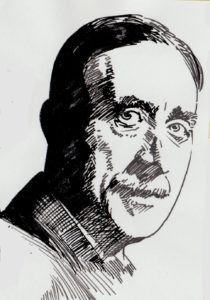 Sir George Dyson (1883 – 1964)
Sir George Dyson (1883 – 1964)
Sir George Dyson was born at 4 Schofield Court, Crossley Terrace, Halifax, the eldest of the three children of Alice and John William Dyson, a Blacksmith who worked at Drake’s Limited, an engineering firm on Shay Lane. George began to play music at the age of 5 and to compose at 7 and in 1900, at the age of 17, he left Halifax to take up an open scholarship in organ and composition at the Royal College of Music in London.
In 1914, he served as a Brigade Grenadier Officer with the Royal Fusiliers and wrote a training pamphlet on the use of the hand grenade for which he became well known. He was invalided out of the army in 1916, suffering from shellshock and returned home a shadow of his former self.
He was the first president of National Federation of Music Societies in 1935 and returned to the Royal College of Music as its Director between 1938 and 1952 as well as being a governor of Sadler’s Wells. Dyson was knighted in 1941 and then in 1943 he became the president of Halifax Chamber Music Society and made a Knight Commander of the Royal Victorian Order in 1953. His short choral work The Blacksmiths, based on a fourteenth-century Middle English poem, was dedicated to the memory of his father.
He is one of the great unsung musical heroes of his day. He was a pillar of the British musical establishment and one of the great educationalists of his time. He was Director of Music in some of the UK’s most prestigious schools, Director of his old alma mater, the Royal College of Music, and the voice of music on the BBC as well as a colourful writer about music.
The Sir George Dyson Trust was established in 1998 with the aim of advancing public education in the understanding and appreciation of Dyson’s music and making available his manuscripts, writings, scores, drafts and memoranda for the encouragement of the study of his work. His son, Freeman Dyson, died aged 96 on 28th February 2020 and remained a champion of his father’s music to the end.
Further reading
https://en.wikipedia.org/wiki/George_Dyson_(composer)
https://www.bbc.co.uk/music/artists/4025719a-0a2c-4a21-9ba4-dfae792bb216
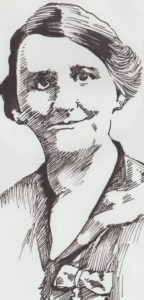 Laura Annie Willson MBE (1877 –1942)
Laura Annie Willson MBE (1877 –1942)
Laura Annie Willson was an English engineer and suffragette, who was twice imprisoned for her political activities. She was one of the founding members of the Women’s Engineering Society and was the first female member of the Federation of House Builders. She was born at 22 Savile Park, Halifax and started work at the age of ten as a ‘half-timer’ in a local textile factory.
Before WW1 she became a very prominent suffragette in Halifax, spending two terms in jail
“If they’re going to lock me up for thinking, they’d better give me a life sentence.”
During the Great War, she was instrumental in getting women into factories to help the war effort. Appalled at the poverty they endured, she set up one of the first works canteens, which became a model for others. She was awarded the MBE for her efforts. After the war she was a founder member of the Women’s Engineering Society, later its President, which society is alive and well to this day. She later moved to Jumples, Wheatley from where she set up an electrical engineering company to improve accessibility and get the new power source into more rural areas. If that was not enough, she decided something needed to be done about the poor housing that was available for working people, so she designed and built her own. There are still at least six housing estates dotted across Halifax built by Laura Annie Willson. There are 2 in North Halifax, Laurel Crescent and Vegal Crescent in Ovenden.
Further reading
https://en.wikipedia.org/wiki/Laura_Annie_Willson
https://www.magnificentwomen.co.uk/engineer-of-the-week/33-laura-annie-willson
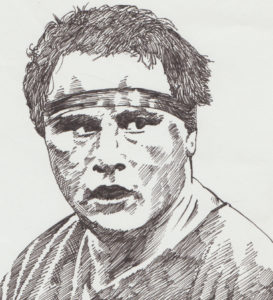 Brian Moore is an English former Rugby Union footballer who played as hooker. He later became a Rugby presenter and pundit for BBC Sport, Talksport and Love Sport Radio.
Brian Moore is an English former Rugby Union footballer who played as hooker. He later became a Rugby presenter and pundit for BBC Sport, Talksport and Love Sport Radio.
Moore was born to single mother Rina Kirk in Birmingham. Abandoned by his father, his mother gave him up for adoption at 7 months old to Methodist Lay Preachers Ralph and Dorothy Moore, who moved to Illingworth and where Moore went to Whitehill Primary School before attending Crossley & Porter School. It was here that he first played Rugby Union for the Old Crossleyans.
He then went on to study law at the University Of Nottingham, gaining an LLB (Hons) degree in 1984.
Moore played as an amateur senior for Nottingham, the club where he made his name and during his time at Nottingham, he won his first England caps and toured Australia with the British And Irish Lions winning five test caps. In 1990 he moved to London to train as a solicitor and played for Harlequins. In 1991, he was voted Rugby World Player of the Year and ended his club career at Richmond.
Moore represented England, winning a total of 64 England caps between 1987 and 1995, He was also a member of the England side which won Grand Slams in 1991, 1992 and 1995.
Having been a vocal critic of referees for many years, Moore took the Rugby Football Union’s Entry Level Referee Award course and qualified as a referee in 2010. The same year in his autobiography “Beware Of The Dog” he revealed that he was sexually abused as a young boy by one of his teachers. The shame he felt at being a victim of abuse made him keep silent about it until he visited the Child Exploitation and Online Protection Centre in London in 2008. He said the trauma made him ferociously competitive on the rugby field.
Moore attended the funeral of his birth mother in January 2020. He revealed afterwards on Twitter that he had in so doing discovered that he was half Chinese. He, along with Prince Harry, both argued that in response to Black Lives Matter, the song “Swing Low, Sweet Chariot”, should no longer be sung in a Rugby context.
Brian Moore is also a patron of the Piece Hall here in Halifax.
Further reading
 Jack Scroby (1936 -2020)
Jack Scroby (1936 -2020)
Born in 1936, Jack Scroby played Rugby Union as a schoolboy at Crossley and Porter Grammar School, then amateur Rugby League for Siddal and Ovenden before turning professional with Bradford Northern playing 104 matches for them between 1955 and 1959, mostly at loose forward. Halifax paid a club record fee at the time of £7,500 to bring him home in 1959, at which time he was with the Duke of Wellington’s Regiment in Northern Ireland and had the distinction of representing the Army against the Navy and the RAF at Twickenham that year.
Jack played 315 matches for Halifax, scoring 22 tries, mostly at prop forward. Highlights of his career were the 1963 Yorkshire Cup Final victory over Featherstone and the 1965 Championship Final win against St Helens. He shared a joint Testimonial with Barry Robinson in 1969, playing his last match in February 1970 before leaving to coach Huddersfield. He then returned to Halifax as coach and was Chris Anderson’s assistant coach during the glory days of the late 1980s when they famously beat St Helens at Wembley in the famous victory over St Helens in 1987. As well as this he served as the club’s timekeeper for 10 years.
He was also later well known in Halifax as a Truancy Officer.
Further reading
https://en.wikipedia.org/wiki/Jack_Scroby
https://www.rugby-league.com/article/56737/rugby-football-league-pays-tribute-to-six-lost-loved-ones
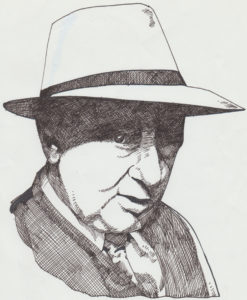 Percy Shaw O.B.E. (1890 – 1976)
Percy Shaw O.B.E. (1890 – 1976)
Percy Shaw was born at Lee Mount and when he was two his family moved to Boothtown. He attended school until he was 13 then took his first job at a blanket mill. Having tasted work he decided that in order to get somewhere he should go to night school. By the time he was in his early twenties welding, boiler-making and machine tool construction gave him more experience, then in 1912 the dye house where his father worked closed down making him unemployed. They formed a partnership working from a workshop attached to their house which enabled them to do odd jobs in the community.
In 1914, and they were engaged in the manufacture of cartridge cases and shell noses under Government contract for the war effort. After the war the firm of Shaw Brothers moved to supplying precision engineering equipment and then into the field of road and path surfacing.
By 1930 he was self-employed and able to employ others to lay tarmac drives and paths. Hand rolling asphalt was slow and strenuous, so he came up with a narrow-type motor roller long before anyone else thought about the idea. One night he was driving through Queensbury to Boothtown when suddenly, out of the darkness, he saw a small but bright reflection in his headlights. He stopped the car and got out. The reflection was from a cat’s eyes and from that day on, in his spare time, he worked to re-invent the ‘cats eyes’ that had saved his life that night. Finally, he was ready to patent his invention and on 15th March, 1935 Reflecting Roadstuds Ltd was started. It would take almost another ten years before they were widely used on the roads in the United Kingdom. The blackouts of the Second World War played a big part in getting them accepted.
By the 1950s he had achieved manufacturing independence, producing the cast iron base, a rubber processing plant and a glass manipulation plant for the production and mirroring of the glass reflector. In the Queen’s Birthday Honours list of 1965 he received an O.B.E. for services to export.”
Further reading
http://www.bbc.co.uk/ahistoryoftheworld/objects/aztoAsvNQ4GBWiQqzOLo5Q
https://www.ypsyork.org/resources/yorkshire-scientists-and-innovators/percy-shaw/
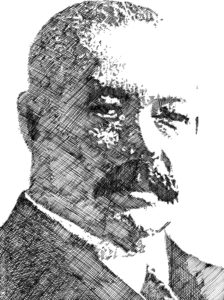 John Mackintosh (1868- 1920)
John Mackintosh (1868- 1920)
John Mackintosh was born in the town of Dukinfield, Cheshire on the 7th of July 1868. Within months of John being born, his Mum and Dad moved to Halifax and to Woodfield Cottage, Old Lane. John Mackintosh later became engaged to Miss Violet Taylor and together they created their own business in Halifax. John and Violet married in 1890 and bought a pastry cook’s shop in King Cross Lane where he became a ‘manufacturing confectioner’. After the first months in the pastry cook business John Mackintosh began to look for something different to sell. The success of Mackintosh’s Toffees was very quick in coming. It wasn’t long before this Halifax Toffee reached other nearby towns and more shops wanted to sell it. From the West Riding of Yorkshire it began to spread to the whole of Yorkshire and then to other parts of the North of England before becoming famous throughout the whole of England. From there countries that were buying products from England, especially those countries who were part of the British Colonies, wanted to try this English toffee. It wasn’t long before countries all around the world wanted Mackintosh’s toffees. John Mackintosh was an astute businessman and advertising genius. On his fist visit to the United States it was said that his was the most famous face in America, next to the President.
A local seed that had been planted in King Cross Lane, Halifax had now grown into a factory that gave 1000 people jobs and gave Halifax a new name – Toffee Town. After he died in 1920, his son Harold took over the running of the firm and went on to bring other favourites out, most famously Quality Street. Mackintosh’s became Rowntree Mackintosh and eventually both companies were bought by Nestles who still manufacture Quality Street here in Halifax.
Further details
https://www.toffeetown.org.uk
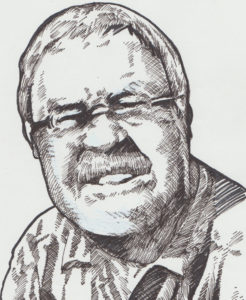 Joe Collins (1946-2018)
Joe Collins (1946-2018)
Joe Collins attended the Halifax Technical High School (now North Halifax Grammar) before gaining a place at the Manchester Regional College of Art & Design where he received a Diploma in Art and Design (Fine Art) Hons as well as a Post Graduate Art Teachers Certificate ( Fine Art). He was part of the Counselling and Career Development Unit at the University of Leeds and a Teacher for 38 years. He lived in Ovenden all his life where he became a Youth Worker, running Ovenden Youth Club. Joe was a Team Manager for Ovenden Amateur Rugby League Football Club.
For Calderdale Council he became Head of Community Education Adult Education and Youth Services. In his retirement he described himself as a volunteer community philanthropist.
In 2009 Joe Collins set the vision for OSCA (Ovenden Sports and Community Arena), to improve the sport and leisure facilities on the existing Forest Cottage Site, Cousin Lane and to build a first-class sports and community hub in North Halifax to bring together rugby, football, cycling, walking, wellbeing & the community.
Joe Collins passed away after a short illness in December 2018. The following year Nigel Adams, Minister for Digital, Culture, Media and Sport visited the site and funding for OSCA was secured 12 months after Joe Collins’ passing. The Joe Collins Legacy Fund was set up to help a young person who made a significant contribution to the community or through sport or the arts to inspire local people, especially young people, to reach their full potential.
Joe Collins vision and commitment led to the realisation of OSCA – the Ovenden Sports and Community Arena.
Further reading
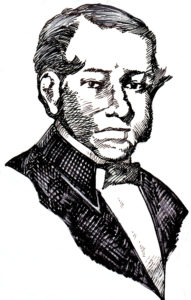 Samuel Webster (1813–1872)
Samuel Webster (1813–1872)
Samuel Webster was born in Ovenden and was the eldest of seven brothers born into the family of farmer James Webster. Webster acquired the small Fountain Head Brewery in Ovenden Wood in 1838 when he was 25 and opened an office in Union Cross Yard, Halifax. The company bought its first public house in 1845. The brewery site was chosen for its Pennine spring which provided the ready water supply necessary for brewing. The water was rich in magnesium sulphate which added bitterness to the beer and provided it with a dry finish. In 1860 he was joined in partnership by his three sons Isaac, George Henry and Samuel Green and the firm began trading as Samuel Webster & Sons. Samuel Webster died in 1872, leaving his sons to continue the business. The firm also imported and sold wines and cigars in addition to its brewing concerns. In 1873 the brewery was extended and redeveloped. By 1880 the company had 100 Pubs to its name and in March 1890 Samuel Webster & Sons became a registered company. The same year the brewery was linked to the Halifax High Level Railway network which became the main form of distribution for the brewery. By 1900 the company’s office had moved to 57 Northgate, Halifax and also the Chateau-styled maltings building was built as part of a development project. By 1958 the company’s existing offices in Northgate, Halifax were proving too small for the expanding company and new offices were custom built on the Ovenden Wood site.
Webster’s was amalgamated with Wilson’s Brewery Ltd in 1985, and for a few years, Wilson’s beers were brewed at Halifax. Websters brewery closed in 1996. In 2013 the maltings building was opened as The Maltings College.
Further reading
https://en.wikipedia.org/wiki/Webster%27s_Brewery
http://breweryhistory.com/wiki/index.php?title=Webster_%26_Sons_Ltd
https://www.yorkshirenostalgia.co.uk/general-items/brewing-in-yorkshire-2/websters-brewery-halifax/
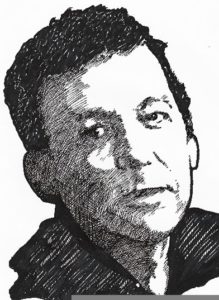 Harold Fisher
Harold Fisher
Harold Fisher was born in Ovenden. His father had wanted to be a drummer and whilst exploring the loft, Harold came across a snare drum. Having then showed a flair for the snare, Harold’s father bought him his own drum kit. Harold enrolled with local drum teacher, Jack Gibson who was the timpanist in the Halifax Orchestral Society and later joined the world famous Brighouse & Rastrick Brass Band. By the age of 14 he was already establishing himself in a series of local trios and quartets and in 1967 Harold moved to London and began playing drums in a variety of Big Bands and soon took the opportunity to work at Elstree Film Studios. He was also able to tour with Pop artists, Engelbert Humperdinck and Tom Jones, although his leaning was always more towards Jazz. A year later Harold Fisher was working on live television every Saturday night on the Lulu Show which led him to work more within the Jazz field, joining the Johnny Dankworth Eleven Fold as well as working with Dankworth’s wife, Cleo Laine. However, commercial work was never far away and teen idols Bay City Rollers were amongst many Pop stars who benefitted from the work of Harold Fisher. In June 1976 he featured on the Number 1 breakthrough song for The Real Thing, “You To Me Are Everything. He has also worked with George Benson and Freddie Mercury on his solo work such as the single “The Great Pretender in 1987.
Neil Peart from the Canadian Rock group Rush was an ardent admirer of ferocious, aggressive drumming greats such as The Who’s Keith Moon and Led Zeppelin’s John Bonham and absorbed influences from a wide range of players besides. For example Gene Krupa, Bill Bruford from the group Yes, King Crimson’s Michael Giles and Harold Fisher.
Fisher has also played for the BBC Big Band and has played for all the major British dance championships including Strictly Come Dancing and contributed to many film scores, including “Labrynth”, “Aliens” and “For Your Eyes Only”.
His son, Damian has continued in his father’s footsteps, recording and touring with top artists as well as touring with some of the biggest theatre shows both in the UK and internationally; whilst his nephew, Martin Davies, founded the Halifax Drum School and turned professional at 16, touring around the UK, Ireland Europe, North Africa, Australia, New Zealand and South East Asia.
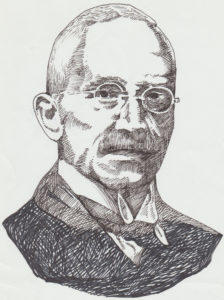 John Henry (JH) Whitley (1866-1935)
John Henry (JH) Whitley (1866-1935)
J.H.Whitley Secondary Modern School was opened in August, 1952. The name was in honour of an Ovenden born person who made an impact far beyond North Halifax. John Henry Whitley was born on the 8th of February 1866 the son of Nathan Whitley from Ovenden. Nathan went on to serve as Mayor of Halifax from 1876 to 1877. His son Percival was in the British Expeditionary Force during the Great War and also went into local politics, working mostly in the Education sector and is credited with starting vocational education in Calderdale, hence the Calderdale College connection. He was Mayor of Halifax during the Second World War between 1941 and 1942 and his sister, Margaret Phyllis, was Mayoress.
His father, John Henry Whitley became Liberal Member of Parliament for Halifax in 1900. In 1917, during the First World War I, Whitley was appointed to chair a committee to report on ‘the Relations of Employers and Employees’ in the wake of the establishment of the Shop Stewards Movement. The smooth running of industry was vital to the war effort so maintaining good industrial relations was a priority. He proposed a system of regular formal consultative meetings between workers and employers, known to this day as “Whitley Councils”. These would be empowered to cover any issue related to pay and conditions of service, and to take matters through to arbitration if necessary. This was a strong model which was to influence industrial relations beyond the UK. He was appointed Speaker of the House Of Commons in 1921, a post he held until 1928, when he resigned on grounds of ill health. He refused the customary peerage offered by the monarch breaking a tradition that had originated in 1789. Whitley was offered a knighthood for his work on this report, but again he declined. His friendship with John Reith led to his appointment as Chairman of the Board Of Governors of the BBC in 1930. In 1932, he made the first broadcast on the Empire Service, which developed into the World Service. He held the Chairmanship until his death.
Whitley died on 3 February 1935, aged 68 and is buried in Lister Lane Cemetery, Halifax.
Further reading
